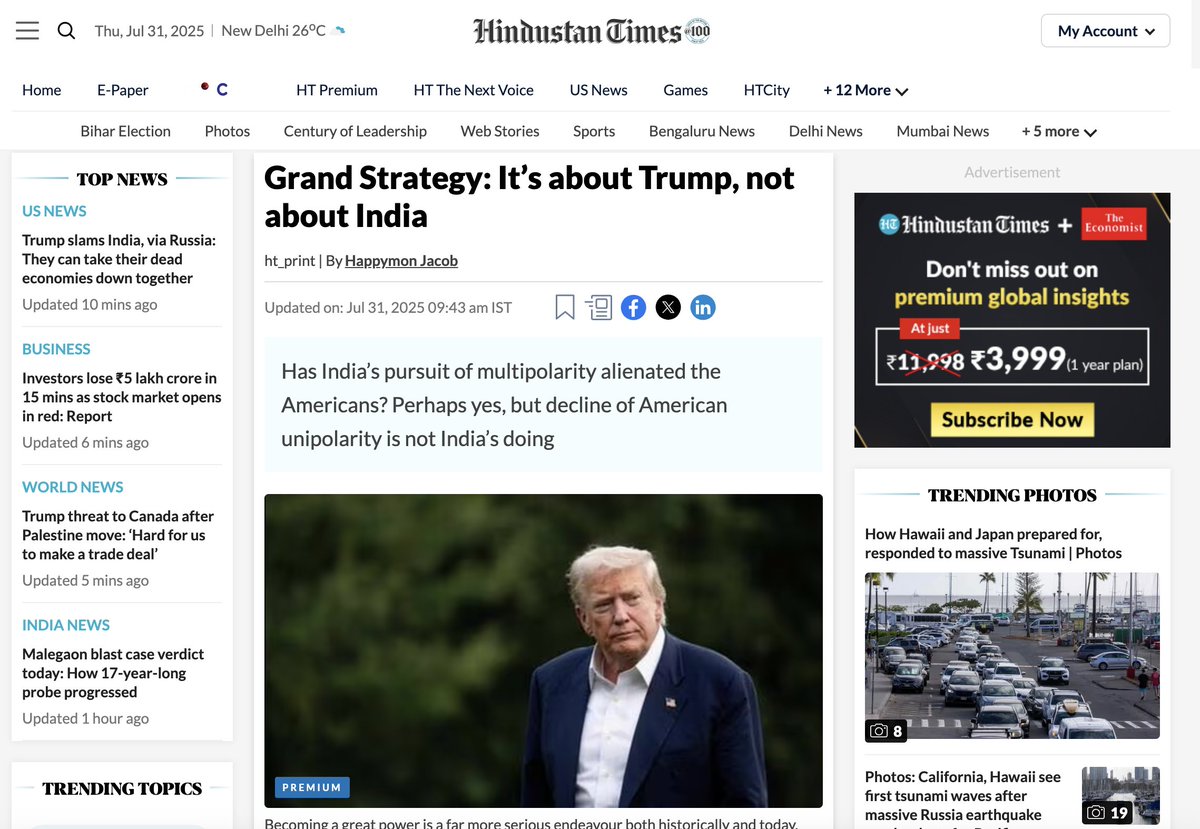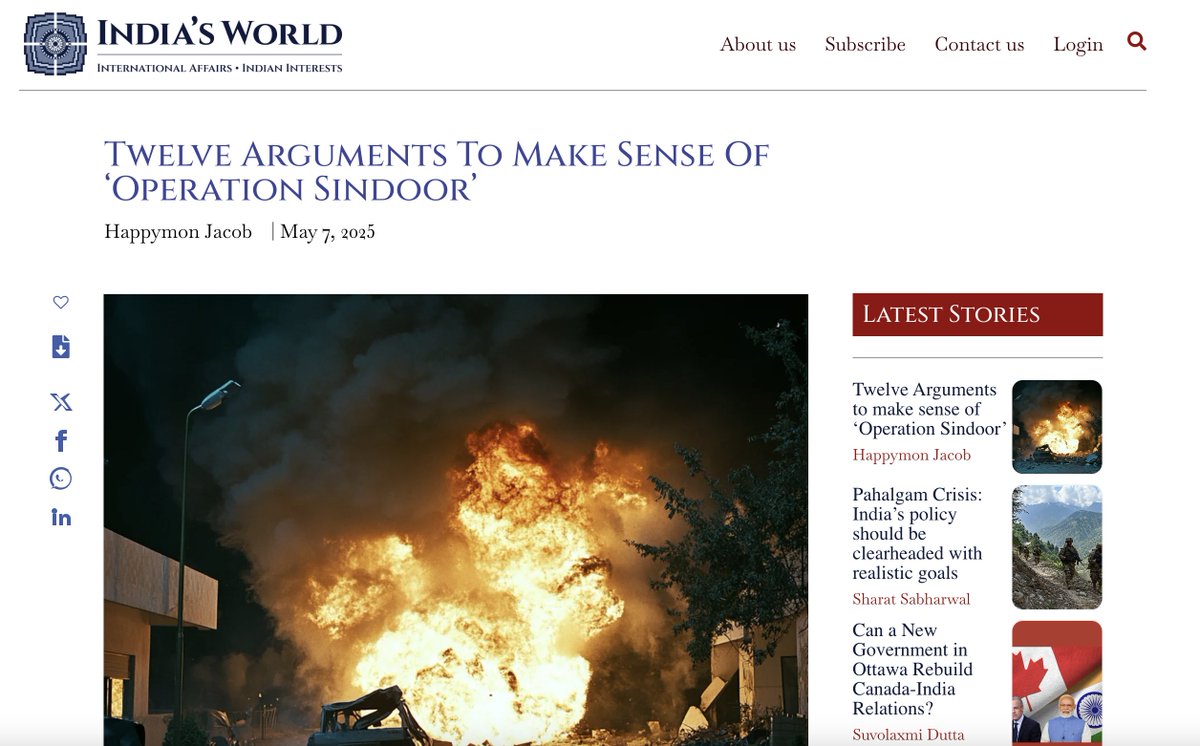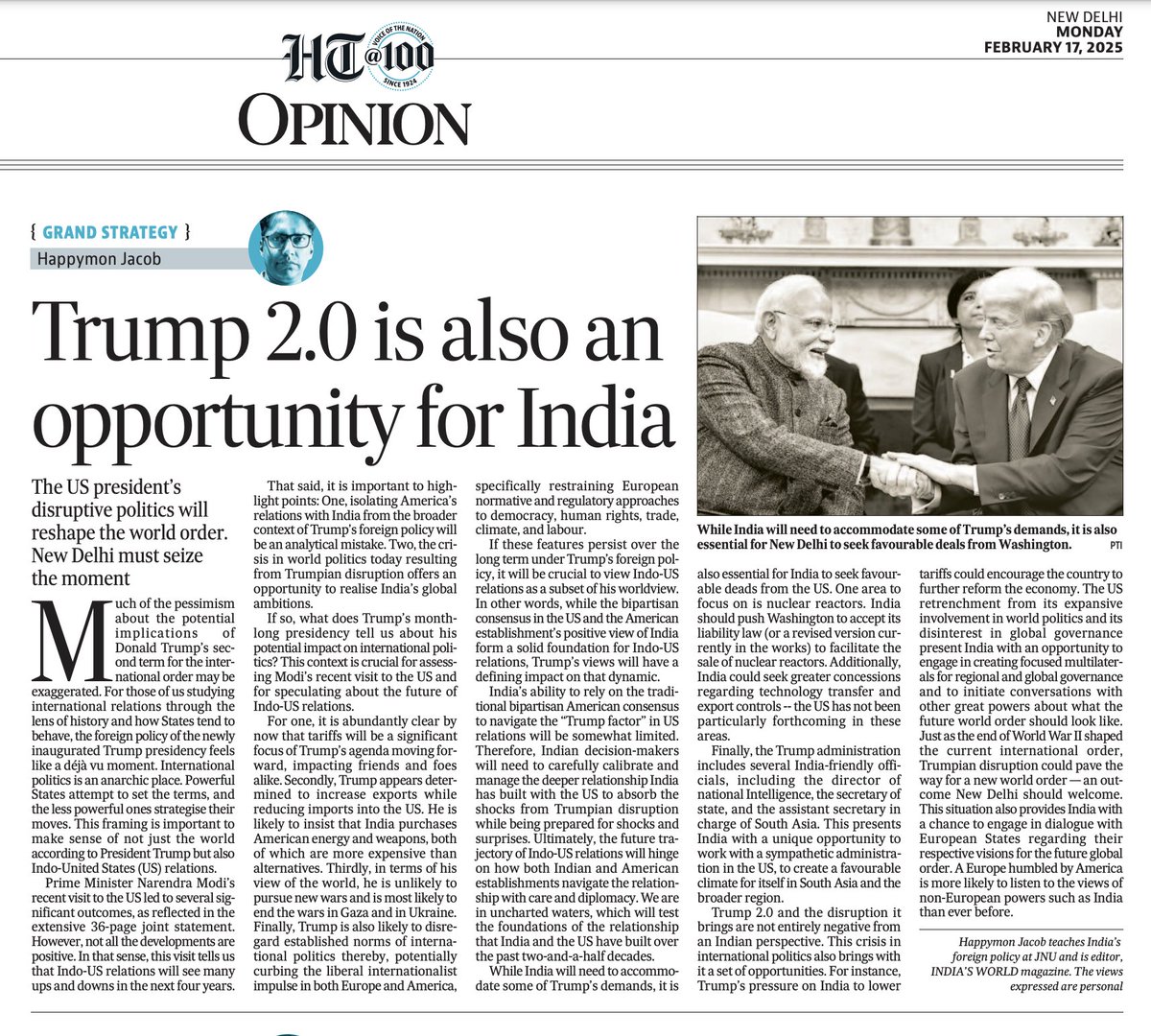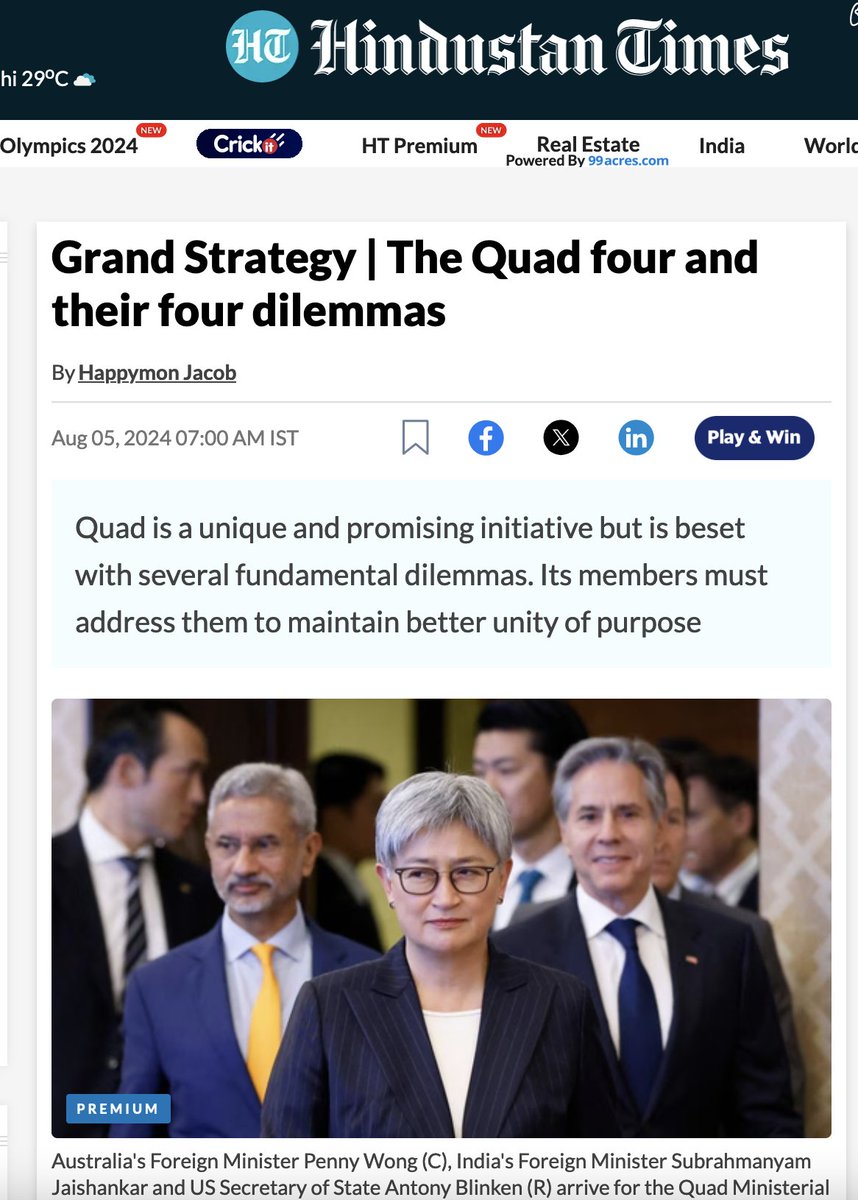In my latest column for Hindustan Times, I respond to the recent Foreign Affairs article by Ashley Tellis "India’s Great-Power Delusions” (July/August 2025)".
I argue that Trump’s policy towards the region is not because of what India is, but because of who Trump is.
I argue that Trump’s policy towards the region is not because of what India is, but because of who Trump is.

A recent article by noted Indian-American scholar Ashley Tellis in Foreign Affairs, titled “India’s Great-Power Delusions,” argues that India’s utility to the United States has diminished for three key reasons:
First, India’s shift towards domestic illiberalism has eroded its soft power and its ability to be a great power espousing liberal values;
second, India undermines American unipolarity by advocating for multipolarity;
and third, Delhi has been reluctant in supporting Washington in countering China’s rise.
second, India undermines American unipolarity by advocating for multipolarity;
and third, Delhi has been reluctant in supporting Washington in countering China’s rise.
I agree that Washington’s new regional approach has suddenly complicated India’s regional and global strategies. However, attributing India’s sticky geopolitical situation today solely to its own choices or domestic political issues is a misdiagnosis of the larger systemic causes.
Let’s examine these arguments in two separate categories: the general American approach to India and the Trump administration’s approach.
These two are largely distinct, as Trump’s foreign policy stands in direct contrast to the traditional American foreign policy prior to his second tenure.
These two are largely distinct, as Trump’s foreign policy stands in direct contrast to the traditional American foreign policy prior to his second tenure.
Let’s first examine American policy towards India before Trump.
Was the Biden administration’s approach towards India deeply influenced by a liberal decline in Indian politics?
Of course, Americans occasionally commented on media curbs, the rise of right-wing politics, and growing anti-minority policies, among others.
Was the Biden administration’s approach towards India deeply influenced by a liberal decline in Indian politics?
Of course, Americans occasionally commented on media curbs, the rise of right-wing politics, and growing anti-minority policies, among others.
However, I have found little evidence suggesting that the U.S. was losing interest in India due to these issues, or that India’s moral standing internationally was being compromised to the extent that it affected its ability to rise as a great power.
In any case, great powers do not rise on the basis of domestic liberal values. Imperial Britain, 20th-century America, Bolshevik Russia, Nazi Germany, and Communist China did not become great or superpowers by serving as moral exemplars for the rest of the world.
Most of them bothered little about how others thought of their moral standing. In fact, I cannot think of a single great power that followed such a path. The argument here is not that being illiberal is acceptable, but that liberal values do not determine whether a country becomes a great power or not.
Has Delhi’s dalliance with multipolarity and its refusal to align as an American ally prevented the U.S. from supporting India’s rise as a great power?
To begin with, could the U.S. have over the past two decades truly facilitated India’s ascent as a great power?
I doubt it.
To begin with, could the U.S. have over the past two decades truly facilitated India’s ascent as a great power?
I doubt it.
Becoming a great power is a far more serious endeavour both historically and today; military or diplomatic support from another power alone cannot make a country a great power.
In fact, how many countries around the world has the United States actually elevated to great power status—except perhaps indirectly helping China by accommodating it into the U.S-led global order?
In fact, how many countries around the world has the United States actually elevated to great power status—except perhaps indirectly helping China by accommodating it into the U.S-led global order?
If India today is not yet a great power, it is because we Indians have not unleashed the necessary reforms and have not undertaken the much-needed military modernisation. Let’s not credit the Americans for our own inadequacies.
Has India’s pursuit of multipolarity alienated the Americans? Perhaps yes, but the decline of American unipolarity is not India’s doing—it’s due to America’s own actions or other powers catching up. Let’s not accept any credit for American inadequacies.
That said, much of India’s multipolar rhetoric remains just that—feel good rhetoric. What exactly is India doing to promote multipolarity beyond participating in forums like the BRICS and SCO (former is expanding to irrelevance and the latter becoming a Chinese shop)?
Thirdly, let’s closely examine the argument that India’s decision not to become Washington’s foot soldier in Asia to curb China’s rise has upset the United States.
In other words, would India have been better off if it had joined the American alliance to counter China?
In other words, would India have been better off if it had joined the American alliance to counter China?
For one, there is little doubt that an India that teamed up with the U.S. to check China might have been worse off today.
Surely, when it comes to China, India is not in a sweet spot, but given how U.S. allies today often find themselves high and dry, there is no guarantee that Washington would have been willing to support India against China.
If so, a country sitting next to China (India) that chose to be an American ally or partner to contain China’s rise would have been worse off in the era of Trump.
Surely, when it comes to China, India is not in a sweet spot, but given how U.S. allies today often find themselves high and dry, there is no guarantee that Washington would have been willing to support India against China.
If so, a country sitting next to China (India) that chose to be an American ally or partner to contain China’s rise would have been worse off in the era of Trump.
Secondly, I have not seen, heard, or read any invitation from the Americans for India to join their military alliance.
At best, India might have been a country outsourced with the loyal duty of resisting China’s rise in the region on behalf of the US, with the hope that eventually the US would support India’s emergence as a great power (while China looks on passively?).
At best, India might have been a country outsourced with the loyal duty of resisting China’s rise in the region on behalf of the US, with the hope that eventually the US would support India’s emergence as a great power (while China looks on passively?).
Thirdly, it is not as if India has been bandwagoning China or not trying to balance China at all (even if not doing enough) within its current capacity.
In any case, a next-door India will need to think carefully before jumping into a distant superpower’s grand strategy to contain China, especially when it is caught between a far more powerful China and a Pakistan that it arms—who, incidentally, is also armed by the US.
In any case, a next-door India will need to think carefully before jumping into a distant superpower’s grand strategy to contain China, especially when it is caught between a far more powerful China and a Pakistan that it arms—who, incidentally, is also armed by the US.
All this was before Trump arrived on the scene. Now what does Trump’s track record of abandoning Ukraine after leading it on the garden path, forsaking its longstanding NATO allies in Europe, striking deals with its ‘archenemy’ China, and courting Pakistan - especially after Rawalpindi helped the Taliban humiliate and force the U.S. and its allies out of Afghanistan - say about his approach to international commitments and alliances?
Do you believe that if India had been more liberal, did not entertain any multipolar aspirations, or actively helped Washington contain China in the past, Trump would have been more positively disposed towards India?
I will let you answer that question for yourself.
I will let you answer that question for yourself.
Trump’s America doesn’t care whether India is illiberal, seeks multipolarity or assists Washington in balancing China. Trump would likely have behaved exactly the same with a liberal India supporting a U.S.-led world order and assisting in checking China’s rise in Asia as he does now.
Simply put, Trump’s policy towards the region is not because of what India is, but because of who Trump is.
• • •
Missing some Tweet in this thread? You can try to
force a refresh








